 Let's face it these last few months have brought about unexpected anxiety and stress throw in a pandemic and an election... well let's just say unwinding may take some thoughtful intentions. So if you find yourself feeling this way, no worries! We have a few of the Allay team’s favorite quick tips to get some R&R now. Whether you're at work or home, these six easy tips will leave you feeling relaxed and peaceful in a minute or less. Stop and Breathe! Options:
CBD has been shown to effectively combat psoriasis as well as other skin conditions such as wrinkles, acne, eczema, and even bruises. Here’s how: Understanding the endocannabinoid system Much of CBD’s success in treating various skin conditions has to do with the endocannabinoid system. The endocannabinoid system is a molecular system within the human body that works to maintain homeostatic balance and harmony. This system relies on the successful and sustained production of endocannabinoids. That is, endogenous cannabinoids found naturally in our bodies. We can help support the balance of this critical system by introducing phytocannabinoids- that’s right, non-endogenous cannabinoids found in the cannabis plant, including CBD! CBD (and particularly full-spectrum products) helps maintain balance and harmony in our skin’s endocannabinoid system, making it immensely helpful in the treatment of various skin conditions. CBD and psoriasis Psoriasis is an autoimmune disease caused by the rapid and problematic multiplication of skin cells, leading to itchy red spots, ‘silvery scales,’ and areas of severe dry and cracked skin. While there is no known cure, certain treatments can help alleviate symptoms. Studies have shown that introducing CBD to our skin’s endocannabinoid system helps reduce the abnormal production of keratinocytes commonly seen in psoriasis, thereby reducing symptoms. CBD’s powerful anti inflammatory properties also plays a major role. Classical treatment for psoriasis often includes strong anti inflammatory drugs, which can have severe and negative long-term side effects. CBD, on the other hand, works by gently yet successfully reducing areas of inflammation (ncbi). CBD is a safe and immensely effective in diminishing the side effects of psoriasis, improving the day-to-day of thousands of patients. Try it for yourself, with Allay's CBD body butter!* *Consult with a physician before use if you have a serious medical condition or use prescription medications. A Doctor’s advice should be sought before using this and any supplement dietary product.
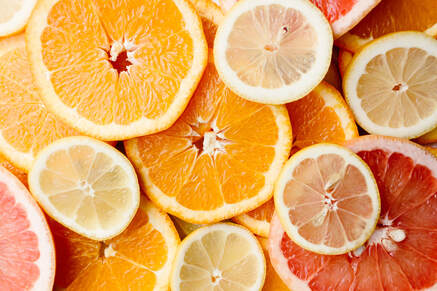 Tips to staying healthy. Tips to staying healthy. With the recent global and local scare around Coronavirus, having a strong immune system is our best defense. Our advice is to keep your medicine cabinet and pantry stocked with supplements and medicinal foods ready to treat the first signs of scratchy throat, fever and sniffles. You will not only prevent colds, coughs and flus, but you will shorten the duration and severity of illness in the event that you do get sick. Keep in mind these interventions work best when applied promptly at onset of symptoms of a common cold or flu. Coronavirus COVID-19 appears to have a long incubation time when people are without symptoms, so prevention is still key. These remedies are not a replacement for medical care in the event that you have a serious illness: please seek medical attention when appropriate. 12 tips to boost immunity throughout the next few months! 1) WASH YOUR HANDS! Yup, so basic. But seriously, this is number one, even when facing highly contagious flu strains. Washing hands in warm water + soap for at least 20 seconds is the best way to wash away germs. Avoid touching your mouth, nose and eyes, unless you’re doing so with clean hands. According to the CDC, if soap and water are not readily available, alcohol-based hand sanitizer that contains at lease 60% alcohol may be used as a substitute. 2) SLEEP + STRESS REDUCTION we have to rest to let our bodies do this natural healing thing! Make sure to get 7-9 hours of restful sleep per night and let go of any unnecessary stressors. Deep breathing, meditation, long walks and yin yoga are all great ways to curb stress. 3) GUT HEALTH it’s said that up to 80% of our immune system is rooted in our gut flora. Improve your gut health by taking probiotic supplements, eating fermented food (kimchi, sauerkraut, kombucha, kefir, miso, yogurt), eating prebiotic fiber to support probiotics (bananas, chicory root, onions, leeks, asparagus, apples, flaxseeds). Avoid taking antibiotics unnecessarily, reduce stress, eat less sugar and sweeteners, get enough sleep, exercise regularly, and avoid consuming conventional meat and dairy products because these animals are often treated with copious antibiotics. 4) EXERCISE it’s no secret that regular exercise will help keep your body healthy, including your immunity. But what about when you’re feeling the onset of a cold? If you usually exercise, then you should definitely exercise when starting to get sick. Break a sweat and get the blood flowing, but don’t push yourself too hard if you’re feeling especially run down. 5) VITAMINS supplements should be started right away at first symptoms of a cold or taken preventatively when exposed to illness. High-doses of Vitamin C, A and D taken for short duration can nip the bad bugs in the bud (say that 5 times fast!). Get your supplements ready to go:
6) ZINC this mineral kills bacteria and reduces inflammation. Zinc lozenges are easy to carry around in your pocket or keep in your office desk. I have skipped countless colds by having this supplement on hand when I get a sore throat; I always keep Zicam stocked for home and travel. Higher doses of this supplement are best used when trying to aggressively prevent illness for a short time. If you take for longer periods, you may need to supplement with copper as well. 7) ELDERBERRY this magical dark purple berry has been used for centuries to combat symptoms of colds + flus: preventing and shortening severity and duration of these common illnesses. Modern research has shown that the flavonoids in elderberry extract binds to the H1N1 human influenza virus and to the H5N1 avian influenza virus in order to carry it out of the body. Bonus: Elderberry also effectively treats sinus infections. It’s best used preventatively or within first 48 hours of onset of symptoms and is safe to take daily throughout cold + flu season.
8) DIET cut out inflammatory foods -gluten, dairy, sugar, fried foods, alcohol and your personal food sensitivities- when you feel the fist symptoms of a cold coming on. I know, all the fun stuff, right? These foods feed viruses and bad bacteria, compromise our gut flora, weaken immunity and are mucus-forming. Instead, focus on eating colorful vegetables, homemade bone or vegetable broths, shiitake mushrooms, healthy fats (like coconut oil, raw nuts + seeds, fatty fish, and grass-fed butter), organic eggs, pasture-raised meat, and wild-caught fish, and of course, the classic: homemade chicken soup. 9) IMMUNE-BOOSTING NUTRIENTS there are so many household immunity superstars that you’re probably already including in daily cooking. To prevent cold + flus, make sure to stock your pantry and fridge with these anti-viral/anti-bacterial nutrients! Raw garlic, onions, mushrooms and local or Manuka honey are immunity boosters. Turmeric, cinnamon, ginger and cayenne are healing herbs. Apple cider vinegar, green tea and echinacea are natural antibiotics. Citrus fruits, kale, broccoli, cauliflower and kiwi are rich in Vitamin C. Meat, shellfish, nuts + seeds, and lentils are high-zinc foods. Stay hydrated with plenty of water, herbal teas, electrolytes and broths. 10) ACUPUNCTURE + CUPPING Acupuncture has anti-inflammatory and anti-stress effects, helping regulate immunity and helping your body get back to a balanced state. Patients may come in for preventative care or once they start feeling symptoms. We frequently hear stories of patients coming back to tell us that acupuncture at onset of a sore throat or congestion successfully prevented a full-blown cough, cold or flu! Cupping research indicates that cupping engages the immune system because the microenvironment is changed when cups are placed on the surface of the skin. Physical signals at local areas turn into a cascade of signals that involve the nervous, endocrine and immune systems; having a whole body effect. Clinically, we place cups over the chest and upper back to stimulate the immune system, help the lungs to clear out phlegm + fluids, and relieve tight + achy muscles. 11) HERBAL MEDICINE echinacea, astragulus, reishi and cordyceps mushrooms are all herbs commonly taken before you get sick to prevent illness. You may stock up on tinctures or capsules in the months leading up to cold + flu season to prevent occurrence. Once sick, Yin Qiao San is a very effective Chinese medicine formula used to treat middle-high grade fever with sweating, chills, cough, sore throat and body aches. The herbs in this formula contain antibacterial, antiviral, anti-inflammatory, immuno-stimulative, detox, and antitussive pharmacological properties. Additionally, we have Chinese medicine formulas that treat the specifics of your symptoms if you do get sick- we can treat dry cough, phlegmy cough, nasal congestion, fever, chills, GI issues, etc. Herbal medicine can be miraculous for shortening duration of nasty viruses, but it’s best to get on top of it sooner than later. 12) STAY POSITIVE our immune systems are enormously influenced by our thoughts, so keep that in mind when navigating the media hype and making decisions about your and your loved one’s health. Invest in the things you have control over: eating well, managing stress, healthy lifestyle, seeking out the kind of medical care that best suits your needs. Let go of feelings of helplessness and fear as best you can; they diminish our reserves and weaken our immunity. Take care! 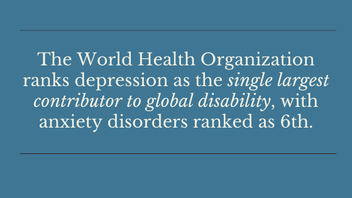 Worldwide, the NCBI estimates that one in five adults (17.6%) within the past year have struggled with a mood disorder (that is, any mental illness defined by the inability to regulate one's mood, such that it impacts one’s ability to function throughout the day), while 300 million (roughly 4.4%) individuals worldwide suffer from depression alone (1). The World Health Organization ranks depression as the single largest contributor to global disability, with anxiety disorders ranked as 6th. The sobering takeaway is that thousands of individuals struggle with mood disorders every single day, including anxiety, depression, PTSD, bipolar, and more. Chances are you have friends or family battling with some form of mental health disorder, or have struggled with one yourself. Even if you have had little to no exposure to mood disorders, the fact remains that you have still experienced anxiety, severe sadness, stress, and other difficult-to-manage emotions. In this post, we’ll explore CBD’s potential in aiding those with mood disorders. CBD and mood disorders Remember last week's post about the Endocannabinoid system? It’s laregly by virtue of this system that CBD and other endocannabinoids have such potential in treating some of the underlying causes of mood disorders. This is because CBD works through multiple pathways, affecting specific pathways in the brain associated with mood regulation. How it works *it’s important to know that most of the studies referenced below are animal studies, meaning that we still do not entirely know the effects of CBD on the human brain. That being said, the research is promising, and the potential for CBD in treating mental disorders is vast. The animal studies below strongly suggest multiple ways in which CBD may be effective in treating neuropsychiatric illnesses. Depression is an immensely complex condition. There is no single underlying cause, and we have much to learn in the way of treating it. According to the Institut Pasteur, 30% of patients are resistant to conventional treatment, including pharmaceutical SSRIs and MAOIs (2). In recent years, our understanding of neuroinflammation and its connection to depression has grown immensely. Neuroinflammation, inflammation of nervous tissue in the brain, is now considered to be one of the major underlying causes of depression- paving the way for new and potentially more effective methods of treatment. CBD has been shown to reduce neuroinflammation substantially (3), making it a potentially highly viable treatment for depressive disorder. Moreover, CBD has been shown to increase the health and function of the hippocampus (4), a part of the human brain responsible for mood regulation. Studies have shown that individuals suffering from mood disorders often have damage in the hippocampus region of the brain. One common cause of structural degeneration and impaired functioning in the hippocampus is chronic stress and anxiety, which may lead to an increase in susceptibility to neuropsychiatric disorders. While more longitudinal research is needed, studies suggest that treatments reversing stress-induced degeneration of the hippocampus may be viable for addressing mood disorders. CBD has also been shown to affect receptors in our brain responsible for regulating the uptake of serotonin and potentially increasing the amount of serotonin in our brains, combating depression and anxiety caused by depleted levels of serotonin. (5) 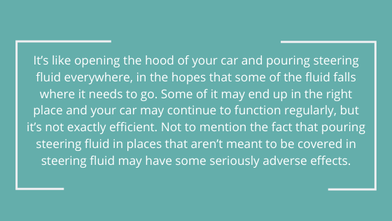 CBD versus Pharmaceutical Medications *CBD is not a replacement for prescribed medications. If you are currently taking a pharmaceutical medication, talk to your doctor before taking CBD or any health supplement which may interact with your medication. Quitting pharmaceutical medications without the support and advice of your doctor may have severe adverse effects. Pharmaceutical medications have come a long way in treating mental health. That being said, there is a lot left to be desired. It’s like opening the hood of your car and pouring steering fluid everywhere, in the hopes that some of the fluid falls where it needs to go. Some of it may end up in the right place and your car may continue to function regularly, but it’s not exactly efficient. Not to mention the fact that pouring steering fluid in places that aren’t meant to be covered in steering fluid may have some seriously adverse effects. Medications act in a similar way- they treat the whole brain, only sometimes affecting and addressing specific pathways. They are largely inefficient methods of treatments, often causing a number of negative side effects, including Insomnia, sexual dysfunction, mood swings, and agitation (not to mention long-term side effects- a subject that we know very little about). CBD has not been shown to produce any such effects. One animal study found that while antidepressants often took weeks to work, CBD had ‘fast and sustained’ antidepressant effects (6). This can be immensely helpful for those unable to wait weeks before feeling the affects of treatment. Multiple other studies have found that CBD significantly reduced levels of anxiety in individuals suffering from anxiety disorders such as SAD (7). The bottom line There is still much to learn about the potential effects of CBD on mood disorders. As mentioned above, most of the studies referenced throughout this blog are animal studies, meaning that the findings in regards to effects on the human brain are merely preliminary. That being said, the research strongly suggests that CBD may be viable for treating mood disorders. As always, talk to your doctor before taking CBD or any health supplement. Citations
With the massive and sudden boom of the CBD industry it seems as if CBD is everywhere. We see it infused in products ranging from tinctures, creams, to toothpaste and beer, all boasting a wide array of benefits. It can be hard to believe that one single product can be effective in treating so many different conditions. In an age of consumerism and misinformation, being a skeptical and discerning consumer is crucial. Understanding what your buying and why is necessary for keeping yourself safe and spending your money wisely. So, is CBD snake-oil? Just another health industry fad, destined to blow over once the next trendy thing takes its place? In short, no! In this blog, we’ll go over what makes CBD such a powerful and wide-ranging product, demystifying one of the most significant medical discoveries of this century- the endocannabinoid system. Of course, it’s important to still be a discerning consumer. Check out this three part series about the drawbacks of the CBD boom, the benefits of CBD, and how to navigate through it all. Or jump straight to part 3, where I provide a quick and easy guide to buying CBD! *At the end of this post you can find a short and informative video by Dr. Kellie Raydon, ALLAY'S science advisor, briefly explaining the endocannabinoid system.* The Endocannabinoid System It all begins with the endocannabinoid system. The endocannabinoid system, also known as the ECS, is a complex molecular system found in the human body that works to maintain balance and homeostasis. It is composed of three main parts:
Endocannabanoids Endocannabinoids are molecules made endogenously in the human body, discovered by a group of scientists researching THC in the 1990s. The two main endocannabinoids produced in the body are anandamide and 2-AG. While most other molecules in our bodies are produced, packaged, and then stored for later usage, endocannabinoids are produced on demand- meaning that they are immediately used to address specific needs, and then broken down by metabolic enzymes. Cannabinoid Receptors Cannabinoid receptors are found all over the human body. They are masters of transmitting information, relaying data to our body's cells and stimulating the correct cellular responses (Jikomes 2019). The two main receptors are CB1 and CB2. The majority of CB1 receptors are found in nerve cells in the brain and spinal cord, although some CB1 receptors can be found in other spots throughout the body. CB1 receptors can be found specifically in the cerebellum, basal ganglia, hippocampus and dorsal primary afferent spinal cord regions (cite)- parts of the brain which are responsible for coordination and voluntary movement, memory, pain regulation, cognitive function, and mood regulation (Glass, Faull, & Dragunow 1997). CB2 receptors are found in the immune system on white blood cells, in the tonsils, and in the spleen (Mayfeild Clinic). One key function of CB2 receptors in the immune system is the regulation of cytokine release, which plays a crucial role in inflammation. The regulation of this system is the reason CBD is such an effective and celebrated anti inflammatory! Metabolic enzymes Once the endocannabinoids carry out their function in our body, they are quickly broken down by metabolic enzymes. Enzymes play an important role in regulating our use of endocannabinoids- they ensure that these molecules don’t linger for much longer than they’re needed.  So, what does it do? The ECS can be found in nearly every system in our body, including our central nervous system, our GI system, our bones, reproductive organs, hormones, immune system, metabolism, and muscles (link). It plays a vast and crucial role in maintaining homeostasis throughout our bodies. Homeostasis: The Goldilocks Zone Often referred to as the ‘Goldilocks Zone,’ homeostasis is that state of being ‘just right'. The human body has a relatively narrow range of conditions under which it is able to thrive. Any system that works to maintain homeostasis helps our bodies maintain balance in response to external conditions which may threaten to throw off this balance. It keeps things just right- not too hot and not too cold. For our bodies to function at peak performance- to stay healthy and feel good- we have to remain as close to homeostatic balance as possible. The endocannabinoid system plays a crucial role in keeping the various systems of our bodies balanced. It is responsible for regulating organ function and maintaining homeostasis throughout the body. 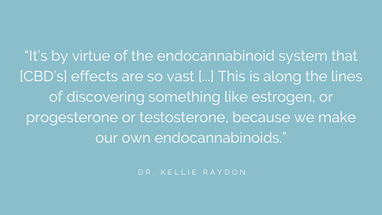 How Cannabis interacts with the ECS You may still be wondering what this all has to do with cannabis. How exactly does cannabis interact with this system? While endocannabinoids are endogenous cannabinoids produced by our bodies, cannabinoids such as THC and CBD are simply non-endogenous cannabinoids found in the cannabis plant. The reason we feel any effects from THC and CBD is because these cannabinoids interact with out ECS. THC, for example, binds to and activates CB1 receptors, producing a ‘high.’ The fact that cannabinoids interact with our own endocannabinoid system is the reason why the effects and benefits of cannabinoids such as CBD are so wide ranging. To be sure, THC and CBD interact with a number of receptors throughout our bodies- not just the receptors in our ECS. However- their ability to work in congruence with and support the ECS is the primary reason CBD has so many different, profoundly beneficial effects. Current research There’s still a lot we don’t know about the ECS, but the current research is promising. The role of the ECS is vast, and the potential of cannabinoids such as CBD is great. Current research suggests that CBD may be effective in treating:
… The list goes on and on. While more research is needed, countless studies have been published strongly suggesting the healing capabilities of CBD. The discovery of the ECS has the potential to change the medical landscape as we know it, and the team at ALLAY is excited to be at the forefront of this change- educating consumers, spreading the word about holistic health, and providing conscious and transparent CBD products! Citations
Glass, M, et al. “Cannabinoid Receptors in the Human Brain: a Detailed Anatomical and Quantitative Autoradiographic Study in the Fetal, Neonatal and Adult Human Brain.” Neuroscience, vol. 77, no. 2, Mar. 1997, pp. 299–318., doi:10.1016/s0306-4522(96)00428-9. Grinspoon, Peter. “Cannabidiol (CBD) - What We Know and What We Don't.” Harvard Health Blog, 27 Aug. 2019, https://www.health.harvard.edu/blog/cannabidiol-cbd-what-we-know-and-what-we-dont-2018082414476. Jikomes, Nick. “What Is the Endocannabinoid System and What Is Its Role?” Leafly, 1 Oct. 2019, https://www.leafly.com/news/science-tech/what-is-the-endocannabinoid-system. Mayfield Clinic. “Brain Anatomy, Anatomy of the Human Brain.” Mayfieldclinic.com, https://mayfieldclinic.com/pe-anatbrain.htm. Last month, some of the team at Allay set up shop at the Body Mind Spirit Expo in Portland, Oregon, an event dedicated to promoting businesses working in natural and alternative health all across the States. Inspired by BMSE’s ethos- their commitment to promoting personal growth through holistic medicine, metaphysics, and alternative health all while benefiting small businesses (like ALLAY☺)- we wanted to write something about the body-mind-spirit connection. What is it, and why does it matter? In this post, we’ll go over some of the fundamental problems with Western Medicine (or allopathic medicine), and the importance of understanding the unity of mind & body. First, a little history In the 17th century, Descartes theorized that the mind and body are two entirely separate and independent entities, capable of existing apart from one another. This theory, commonly called ‘mind-body dualism’ was immensely influential- we see mind-body dualism in every-day popular thought, religion, as well as modern science and medicine. Being a Philosophy graduate, I have to add that the story is a little more complicated than this (if you have time, read Descrates’ letters to Princess Elisabeth of Bohemia). The takeaway, however, remains the same- that the Western model of medicine adopted mind-body dualism. Our scientific and medical model has staked itself on a faulty and largely questionable philosophical point of view. The mind, as the seat of our reason and thought, is thought of as the thing which differentiates us humans from the rest of the animal world. We live now in the age of reason- where truth and the validity of an idea is determined by rationality and thought, while other means of knowledge (i.e. bodily knowledge, emotional knowledge, or observation) are considered unreliable, invalid, and inferior. Reason is king- for now. The effect that this mindset has had on our healthcare (not to mention countless other aspects of our lives) is profound. Modern medicine has been structured in a way that denies, or at best ignores, the interrelation between mind and body, while bodily and emotional forms of knowledge are often disregarded or undervalued. Of course, a lot of this is changing. Alternative medicine is on the rise, and the team at ALLAY is doing what we can to be at the forefront, educating consumers, helping other businesses grow, and offering conscious products for holistic health. Allopathic Medicine Allopathic medicine, or modern medicine, is an evidence-based model which treats or suppresses the patient's symptoms or pathophysiological processes. It treats diseases and patients in parts- looking at symptoms and individual diseases and things which can be treated on their own, without looking at the holistic whole of the individual. I want to be clear that I’m not condemning modern medicine. We have made incredible strides in our ability to treat serious diseases and conditions, and our current model of medicine has tremendous benefits. The problem arises when people turn to modern medicine without looking at whatever else might be out there. We turn to pharmaceutical and symptom-based treatment without ever considering that there may be better options. And there often are. Holistic, ‘whole-person’ medicine Holistic medicine, on the other hand, strives to treat the whole patient. This means not only treating the specific disease, but the underlying factors which may be causing, catalyzing, or worsening the condition. It treats the person instead of the disease. Holistic medicine not only considers physical causes and symptoms, but also social, mental, and spiritual causes. The foundational belief is that all of these factors are profoundly and unequivocally interrelated- if one part of your psyche (be it physical, mental, spiritual, or social) is off balance, it can affect your entire system. One fascinating example of the way the social and mental can affect the physical is the condition of nostalgia, or homesickness. A severe bout of Nostalgia in the Union Army during the Civil War caused a handful of soldiers to die of gruesome symptoms, including strange sores, fever, and intense fatigue- all because they were feeling homesick. The social standards of the time (which valued family connections and community) along with the added stress of war gave rise to a condition where people could actually die of homesickness. This type of psychosomatic experience, although strange to us today, is not rare. Psychosomatic illnesses caused by stress or other emotional factors can range anywhere from IBS, to migraines, to fever. Moreover, The levels of specific hormones in our bodies, caused by our emotional and mental responses to stimuli, can also work to effect our immune system, the function of vital organs, and more. Countless studies demonstrating the inter-relatedness of one’s mind, social setting, and physical health have been published, but large systems (like the modern health system) can be slow to change. Mind over Matter- Rationalism vs Bodily Knowledge Another consequence of Cartesian mind-body dualism is the idea of rationalism, mentioned earlier in this post. Rationalism is the idea that the mind, being not only separate from the body, but also truer and purer in essence, can control the body. Rationalism argues that what separates humans from animals is our ability to reason, to act and think with our mind alone. The tragedy here is that it ignores other ways of thinking and knowing within our bodies. It poses the mind and reason over other more corporeal forms of knowledge. There are other non-lingual, non-rational ways of understanding the world. We understand and know through emotion, through visceral feeling. This may sound overly esoteric. And yet studies are cropping up showing the countless ways we know and understand the world through our bodies, not just our brains. The ‘master-slave’ relationship between mind and body promoted by Cartesian rationalism is false. Take, for example, your gut. Your gut has it’s very own neural network, called the enteric nervous system (ENS). The ENS plays a large role in regulating, producing, and receiving neurotransmitters such as dopamine and serotonin. So the common colloquialisms, ‘gut-feeling,’ ‘gut-wrenching,’ or having ‘butterflies’ are more than just metaphors. We feel, perceive, and understand things through our gut. We feel what is going on in our bodies, sometimes more accurately than we are able to think it. You may know something is wrong in your body- not because you have any specific set symptoms or rational cause for belief- but because you can feel it. You sense that things aren't quite right. In the same way, you can often sense what treatment might be needed to get better. Our bodies know how to heal themselves, we just have to learn how to listen. When we learn to listen to our body- to lean on our inherent corporeal and emotional knowledge, as well as our reason- we get a more complete, holistic picture of the problems that might be ailing us. When we treat diseases and conditions, we cannot limit ourselves to the scope of rationalism and dualism. Understanding the unity of our mind and body is essential to seeing (and treating) the whole picture.
The team at ALLAY is proud to be part of a community striving for better, holistic, conscious health. Keep reading our blogs to learn more about holistic health and the power of CBD, and check out our own CBD Infused Body Butter. ✨ G I V E A W A Y ✨ // MIND YOUR BODY !
During the change of seasons and with holidays fast approaching, it’s especially important to put self-care on top of your list! We’ve partnered with 3 amazing brands to get your mind and body ready for Autumn. Enter for a chance to win $300+ worth of wellness products to treat yourself!⠀⠀ The winner 💫 will receive all of the following products:⠀ ALLAY: ALLAY Muscle Recovery Body Butter with 20gm of CBD -Hemp. Organic and vegan. 🏃♀️🏃♂️ SPORTLAND TEA CO: instant Matcha + CBD blend! Organic teas designed to improve performance. 🍵 Clean energy for all athletes. 🏃♀️🏃♂️ VELOBAR CBD: Great-tasting CBD Protein Bar for Relaxation and Recovery. Organic, Vegan, non-GMO, Gluten-Free. 🏃♀️🏃♂️ Rules: (1) Open to anyone 18 years or older. US/CND citizens only. (2) Giveaway ends Tuesday 10/22 at 12:00 PM PST. (3) Winner will be chosen randomly and announced on Wednesday 10/23 via Instagram. This giveaway is in no way sponsored, endorsed, or administered by, or in association with, Instagram. Shop Now: https://www.allaytopicals.com/products.html . #giveawaycontest #selfcaregiveaway #skincaregiveaway #selfcaredaily #skincarediary #meditationstation #meditationcushion #selfcareroutine #selfcarefirst #selfcareday #selfcaretime #contestday #cbd #cbdoil #getcanapa #allaycbd #topshelf #fall In last week’s blog readers learned how to avoid buying CBD with false or misleading labels, choosing the safest and most effective CBD product. But the question still stands; what type of CBD should I buy? CBD products range anywhere from bath bombs, to smokable oils, to CBD capsules. Choosing the right product and method of administration plays a direct and important role in its effectiveness. In this post, we’ll go over the four most common methods of administration, and how to know which one is best for you. In the end, the choice is up to you. If one product hasn't been working the way you’d like it to, switch it up! Try out different products with different extraction methods and methods of administration. Just make sure to always check for a CofA, and make sure what you’re buying is extracted from USDA certified organic hemp. Understanding the endocannabinoid system To understand exactly why the method of administration matters, we first have to understand how CBD works within our bodies. It all starts with the endocannabinoid system… The endocannabinoid system is a molecular system within the human body that works to maintain balance and homeostasis. This system includes endocannabinoids (these are naturally occurring cannabinoids within our bodies), enzymes, and receptors that cannabinoids bind to. We have much to learn about the exact function of the endocannabinoid system- what we do know is that it’s responsible for regulating and protecting the function of many important systems. The endocannabinoid system affects our cognitive processes, appetite, memory, fertility, and more. This system is the whole reason we experience any psychological and medicinal effects of CBD and THC. So, what happens when you use CBD? To take affect, CBD molecules must enter the bloodstream and bind to receptors within your endocannabinoid system (CB1 and CB2 receptors), as well as other non cannabinoid receptors- like your serotonin receptor. The ease with which your CBD product transfers from the site of application into your bloodstream is known as the product's bioavailability. The easier it is for a product to enter your bloodstream and bind to it’s relevant receptors, the more effective it will be. Now that we have a grasp on the way in which CBD interacts with our bodies, let’s go over some of the main methods of administration! Oral ingestion Oral ingestion of CBD includes CBD capsules and edibles. Before being absorbed into our bloodstream, CBD molecules must pass through our digestive system and into the liver, where they are then broken down and metabolized. This process is known as first-pass metabolism, or the first pass effect. During this process, enzymes in the liver break down CBD, greatly reducing its concentration before entering the bloodstream. For this reason, orally ingested CBD typically has very low bioavailability. Many companies have taken measures to counteract this problem. Namely, companies have begun to make water soluble CBD. CBD is typically hydrophobic, meaning that it doesn't mix with water. During the production of water-soluble CBD, however, CBD molecules are broken up (and I mean really broken up- into less than 100 nanometers) and suspended in water. This allows for the CBD molecules to be more easily absorbed into our bloodstream, thereby increasing bioavailability and effectiveness. Even so, orally administered CBD generally has Sublingual CBD Sublingual CBD is anything administered under the tongue. This includes tinctures, concentrates and oral sprays. When sublingually administered, some of the CBD is absorbed directly into the bloodstream through the membrane under the tongue, while some is swallowed (and undergoes first-pass metabolism). Because some of the CBD is able to bypass first-pass metabolism, sublingual CBD has a much higher biovailability than orally administered CBD, making it significantly more effective. Like orally administered CBD, you can find water soluble sublingual CBD with an even higher bioavailability. The downside to water-soluble, sublingual CBD is that production costs are high, meaning that products are generally more expensive.  Inhalation Inhalation involves any CBD product which is consumed by vaporizing or smoking CBD. The membrane of our lungs is highly permeable, allowing CBD molecules pass into the bloodstream with ease. This means that inhalation boasts a high level of availability, and a very quick onset. There are, however, risks associated with smoking or vaporizing of any product- including CBD. For one, companies can use artificial and harmful thinning agents to vape oils- namely, polyethylene glycol and propylene glycol. When smoked at high temperatures, these compounds may break down into harmful carcinogens. Many companies claim that propylene glycol is harmless, but research backing this assertion is limited. In one study conducted on mice, researchers found that the propylene glycol and glycerol have negative and unsuspected effects on our circadian rhythm, directly affecting the onset of various psychiatric and metabolic diseases. Other studies have linked propylene glycol to an increase in asthmatic symptoms and other respiratory conditions. One way to avoid this problem is to look for products made with vegetable glycerin, or simply smoke CBD 'flower,' or CBD plant matter. Even so, inhalation is not advisable for everyone. If you do choose to buy CBD concentrate, vape, juice, or flower make sure to consult your doctor before hand. 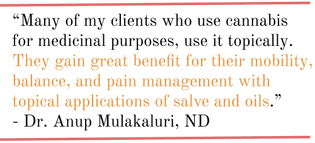 Topical CBD Topical CBD includes CBD administered directly onto the skin using any sort of lotion, balm, or salve. There are cannabinoid receptors (CB1 and CB2) all throughout our skin, making CBD lotions and balms a viable and effective method of administration. When applied directly to the skin CBD molecules are able to bypass the liver and bind directly to the receptors in our skin, avoiding the first-pass effect. The benefits of CBD lotion are localized- meaning that rubbing CBD lotion on your knee may not help manage anxiety or increase memory. That being said, CBD lotion is the best option for local ailments (such as back pain, arthritis, wrinkles, acne, wounds, and more). Numerous studies have found that topically applied CBD is effective in treating localized ailments and serious skin conditions. One study conducted by La Clinica Terapeutica concludes that “the topical administration of CBD ointment [...] is a safe and effective non-invasive alternative to improve the quality of life in patients with some skin disorders, especially of inflammatory background” (B. Palmieri et. al). In an article about the clinical benefits of CBD, Dr. Anup Mulakaluri, ND, discusses the advantages of topically applied CBD on his patients, stating “many of my clients who use cannabis for medicinal purposes, use it topically. They gain great benefit for their mobility, balance, and pain management with topical applications of salve and oils." 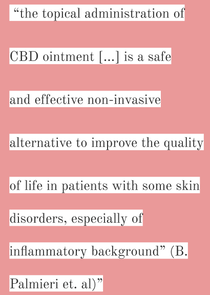 Because the lotion has to permeate the skin to reach it’s relevant receptors, it’s important to use enough product- really lather it on. This can be a downside with some CBD products, which tend to make your skin a little oily, especially if you use a lot. But no worries, ALLAY has your back- our lotion glides on beautifully and soaks right in, letting you feel the benefits of CBD without sticky or greasy skin. The takeaway So, what does all this mean? How do you know which CBD product is really right for you? It depends on what you’re using it for. If you’re looking for something to help improve your memory, manage mood disorders, or effect any non-localized ailments, water-soluble sublingual CBD is probably best. It has some of the highest bioavailability, quickest onset, and most long-lasting effects. If you’re looking for something to treat a localized ailment or any sort of skin condition, look no further than topical CBD. Allay creates potent, highly effective CBD topicals that soak right through your skin, effectively treating whatever ails you while leaving you with soft, happy skin! Citations
Lechasseur, Ariane, et al. “Exposure to Electronic Cigarette Vapors Affects Pulmonary and Systemic Expression of Circadian Molecular Clock Genes.” Physiological Reports, vol. 5, no. 19, 5 Oct. 2019, doi:10.14814/phy2.13440. Mulakaluri, Anup. “Clinical Application of Cannabis, Cannabiniods (CBD).” Natural Rhythms Integrative Medicine, 11 Dec. 2017, https://nrimseattle.com/blog/2017/11/27/clinical-application-cannabis-cbd/. PALMIERI, B.; LAURINO, C.; VADALÀ, M.. A therapeutic effect of cbd-enriched ointment in inflammatory skin diseases and cutaneous scars. La Clinica Terapeutica, [S.l.], v. 170, n. 2, p. e93 - e99, apr. 2019. ISSN 1972-6007. Pond, SM, and TM Tozer. “First-Pass Elimination. Basic Concepts and Clinical Consequences.” PubMed, National Center for Biotechnology Information (NCBI), Jan. 1984, https://www.ncbi.nlm.nih.gov/pubmed/6362950. What’s the difference, and why does it matter? Hemp vs Marijuana First, we have to understand where these products are coming from. CBD oil and hemp seed oil are both derived from the same plant, Cannabis Sativa. There are two main categories that we will be looking at; hemp and marijuana. While many people refer to hemp and marijuana as ‘strains’ of the cannabis plant, this is incorrect. Simply put, they are general categories defined by the plant’s THC content. Hemp generally contains less than 0.3% of THC, and is grown to produce clothing, paper, biofuels, bioplastics, dietary supplements, cosmetics, and foods. Marijuana, on the other hand, has a higher ratio of THC, and is typically cultivated for recreational use. CBD oil CBD oil is derived from the stalks, stems, and flowers of the cannabis Sativa plant. CBD, or Cannabidiol, is one of hundreds of phytocannabinoids present in the plant. This compound boasts a number of impressive benefits, ranging anywhere from promoting healthy skin, to curbing anxiety, to helping manage seizures. Hemp Extract Hemp extract, on the other hand, is derived from the seeds of cannabis plants. It contains virtually no cannabinoids- no THC, CBD, or CBN. While hemp seed oil may not have the same benefits as CBD oil, it is still rich in antioxidants, omega-3 and -6 fatty acids. Hemp extract is also a powerful and very effective moisturizer. The takeaway: If you’re looking for something that possesses the unique benefits of CBD, make sure you check the label. Read more about the benefits of CBD here, where informational blogs are posted weekly from the team at Allay!
And check out my other blog, which offers a quick and easy guide on how to buy CBD, what to look for, and how to read a Certificate of Analysis. CBD’s antioxidant, anti-inflammatory, and moisturizing properties help effectively combat wrinkles as well as other signs of aging. Although there are many factors that may increase the prominence and onset of wrinkles, those creases in your skin are a natural sign of aging. A side effect of living a full life on this earth. If, however, you are bothered by your wrinkles, here’s what you need to know: As people age, our skin becomes less elastic, losing its ability to heal, fight inflammation, and retain moisture. Meanwhile, a decreased production of natural oils dries out skin. This is where CBD comes in. In this post, we are going to look at three main properties, all of which directly address and combat the root causes of aging skin.
All of these factors play an important role in combating the production and appearance of wrinkles- but it doesn’t stop there. A lot of CBD’s effectiveness for treating skin has to do with our own endocannabinoid system. This system, which is present in our skin, works in harmony with the cannabinoids found in the cannabis plant (including CBD). By introducing compounds such as CBD, we are able to aid and maintain the homeostatic balance supported by the skin’s endocannabinoid system. Not convinced? See for yourself! Check out Allay’s own luxurious, potent, and ethically sourced CBD body butter, or read what our clients are saying. Age beautifully- your way.
|
AuthorCBD AllAY Archives
November 2020
Categories
All
|
Shipping and Warm Weather policy: As our product is heat sensitive - we do not ship over weekends and or holidays during peak summer months. We contact all customers with shipping notifications and please store your product in a cool dry place.
Terms Of Service | Privacy Policy | Medical Disclaimer
The Information contained on this site is not intended to diagnose or treat any condition and should not replace medical advice. Always consult with a physician or other health-care professional. Keep out of the reach of children.
This product should be used only as directed on the label. It should not be used if you are pregnant or nursing. Consult with a physician before use if you have a serious medical condition or use prescription medications. A Doctor’s advice should be sought before using this and any supplement dietary product. All trademarks and copyrights are property of their respective owners and are not affiliated with nor do they endorse this product.
This product should be used only as directed on the label. It should not be used if you are pregnant or nursing. Consult with a physician before use if you have a serious medical condition or use prescription medications. A Doctor’s advice should be sought before using this and any supplement dietary product. All trademarks and copyrights are property of their respective owners and are not affiliated with nor do they endorse this product.



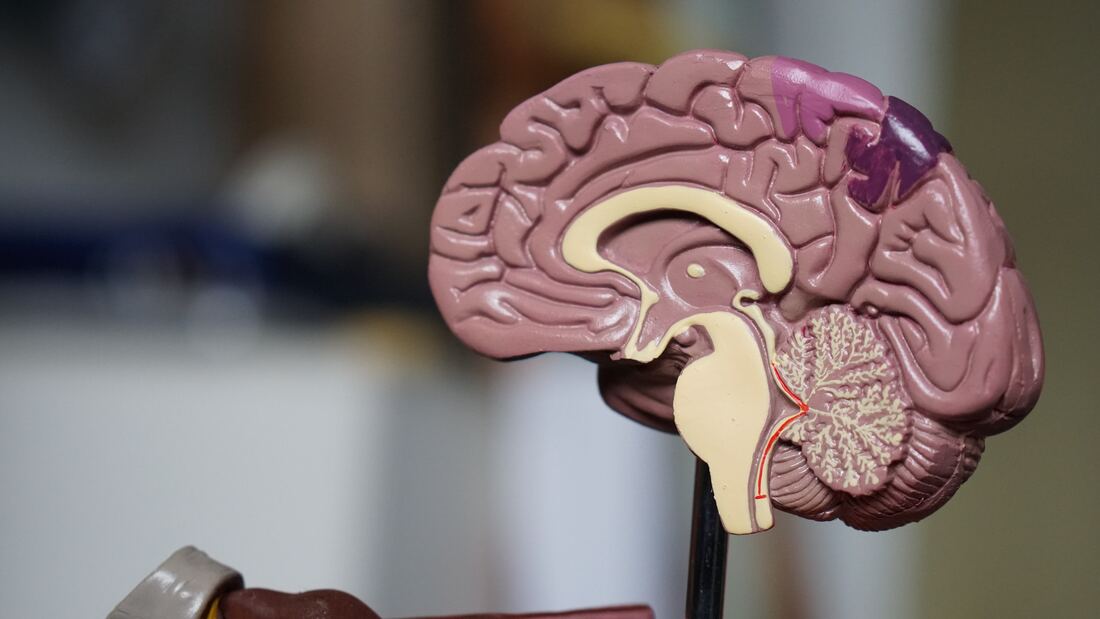
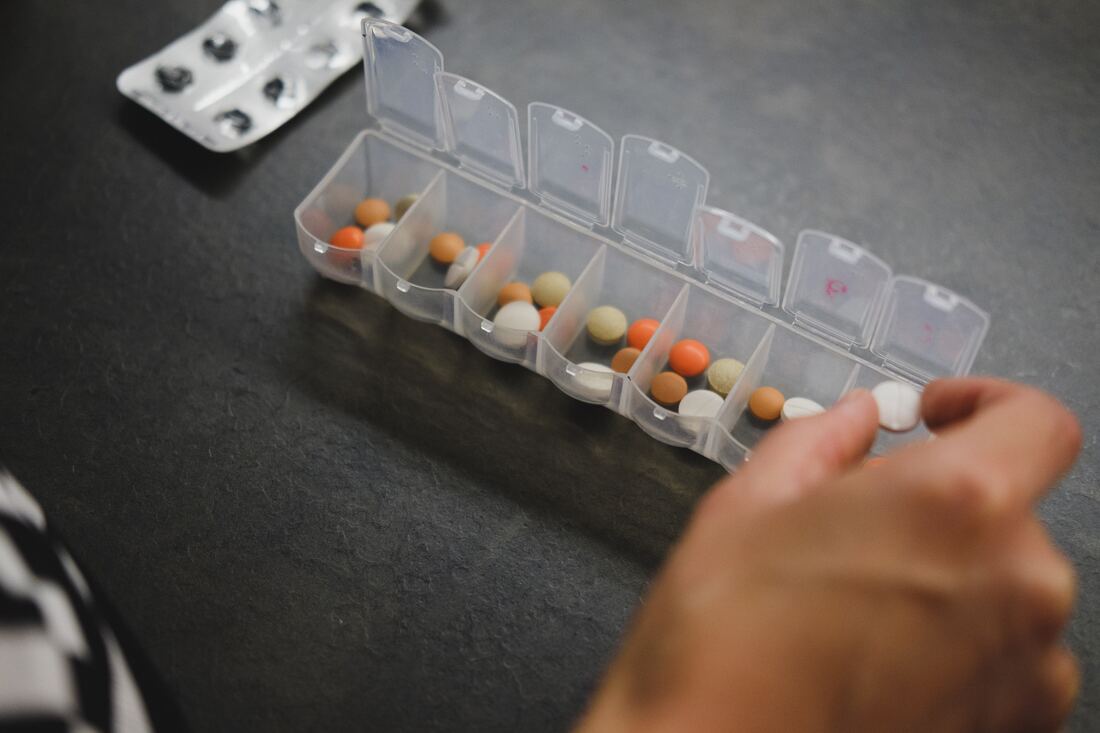


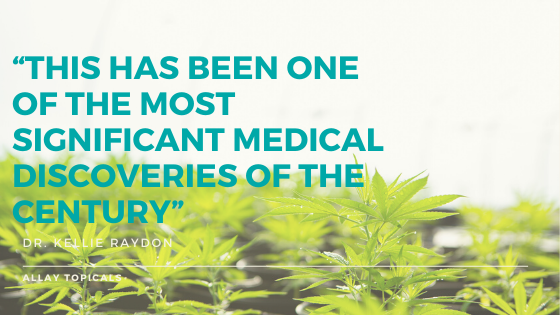

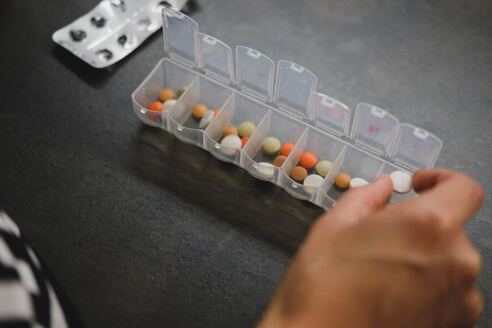

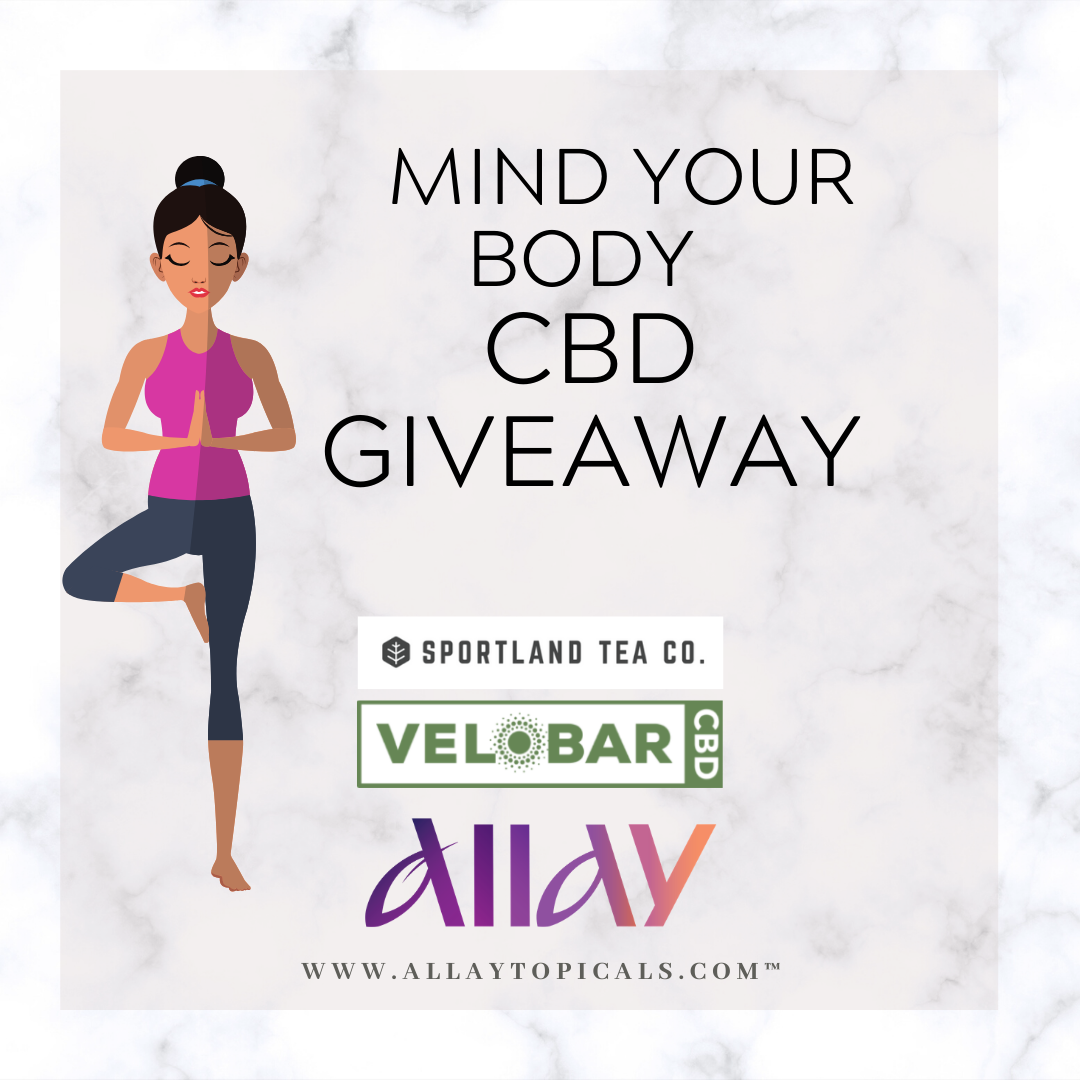

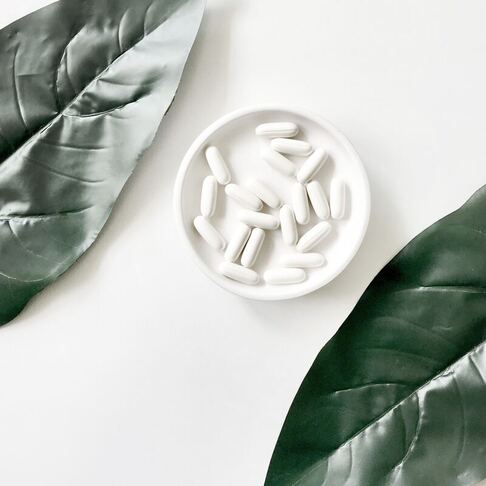
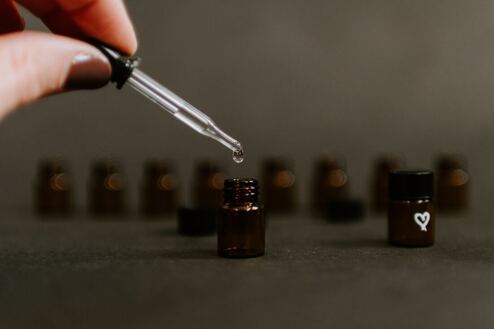
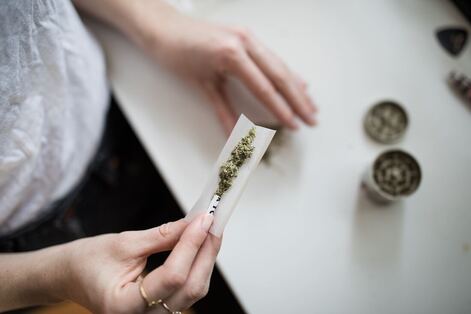

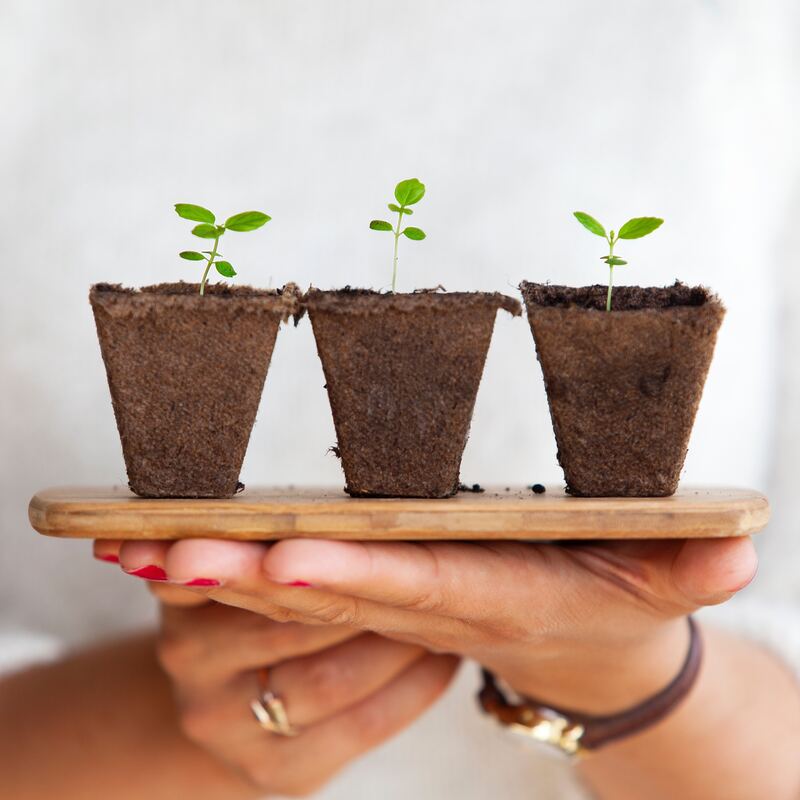
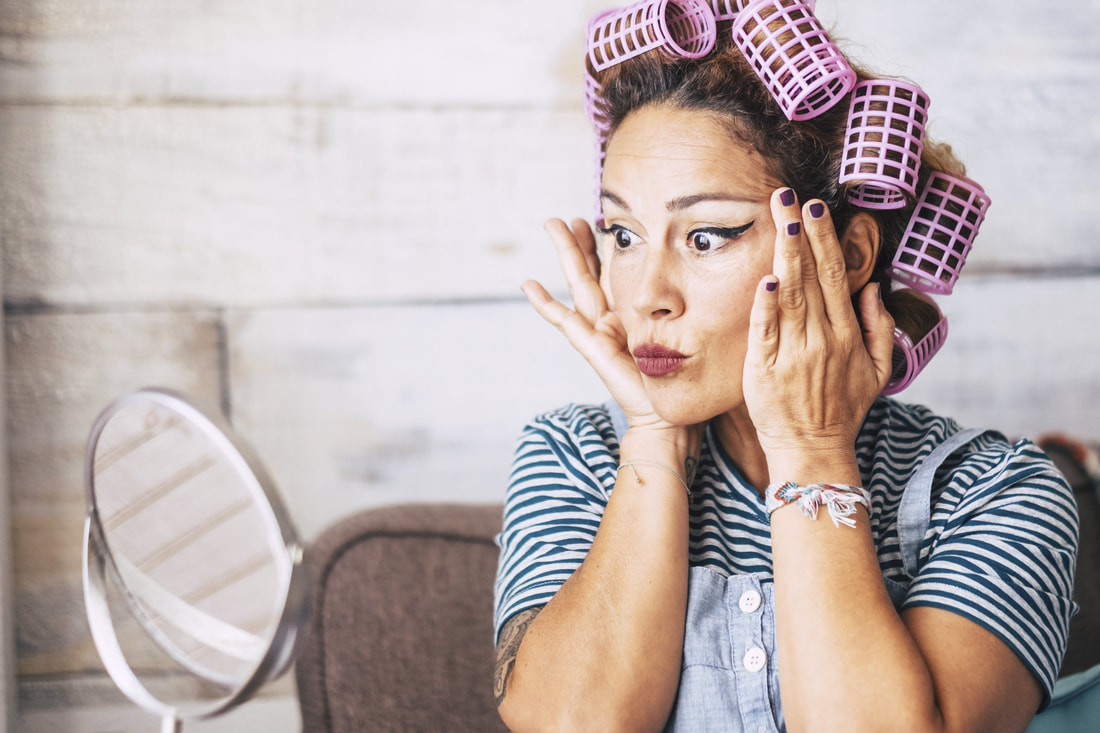
 RSS Feed
RSS Feed
